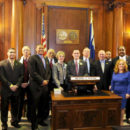The Springfield City Council is gearing up for another effort to revive citizen-led commissions overseeing the promotion and discipline of police officers and fire fighters. This will be the latest move in the almost decade-long attempt to restore civilian oversight.
The commissions overseeing Springfield’s police and fire departments were disbanded in 2005 during the reign of the finance control board and then-mayor Charlie Ryan. The civil service positions of police and fire chiefs were left vacant, and hiring and firing authority was delegated to commissioners appointed by the mayor.
Civilian boards, also appointed by the mayor, were created to review complaints and recommend disciplinary actions. However, those boards only serve in an advisory capacity, something the new City Council President, Michael Fenton, says he plans to address.
“The proposals that I expect us to entertain will result in more actual tangible authority,” he says.
Fenton says previous attempts to insure stronger civilian oversight were stymied by what he calls a contractual obligation between the city and current police commissioner William Fitchet. But Fitchet is retiring in July. As a result, Fenton says, the council now has more flexibility in re-writing the next commissioner’s role and that of a stronger board.
Independent oversight of both the police and fire departments is something the Rev. Talbert Swan would like to see. Swan is president of the Springfield branch of the NAACP and a long-time critic of the current structure. He says as both commissioners have to report directly to the mayor, the mayor in essence has the final say-so in hiring, firing, promotions and discipline.
“There’s a history that exists in both departments,” Swan says. “A history of racial discrimination, a history of nepotism, a history of abuse of power. And now the only thing that stands to oversee the operations is the mayor. And that’s a problem.”
“If they’re going to implement this board in some form, it has to have more authority,” says Joanne Morales-Harrison.
Morales-Harrison works in the Hampden County Sheriff’s Department and has served on both the former Police Commission and the current Community Police Hearing Board. She says more authority is necessary for the board to meet its mission of providing both public safety and community support. And given the time commitment involved in the voluntary position, Morales-Harrison says the work of board members needs to be respected.
“I mean, we’re reviewing cases every week, dozens of cases, not one or two. So when you’re committed that much to putting into something that you believe in and you’re making recommendations, it’s important that the recommendations they make are followed through,” she says.
Any proposal to add teeth to the Police board is going to have to overcome opposition from Mayor Domenic Sarno, who says it’s working just fine as it is.
“When you look at the reports that have come out there, everything that board has recommended the commissioner has followed through, if not tougher,” Sarno says. “So that is something that I’m not going to entertain and also I don’t think legally can be done.”
Moreover, Sarno intends to pick the next commissioner from within the department’s currant ranks as opposed to conducting a national search as called for by some councilors.
“The buck stops with me,” he says. “It comes under the realm of a strong mayor charter. And the mayor, he or she, makes those appointments as we move forward.”
A proposal by Councilor E. Henry Twiggs to establish a more powerful civilian led-commission failed by just one vote in 2011. Twiggs says given the new councilors elected in November, the measure may have a better chance of passage this time around.
“You got to get a solid vote and you got to be prepared to override a mayor who’s not supporting it. You’ve got to be prepared to override him.”
At least nine votes out of thirteen would be needed to override a mayoral veto. Whether that number exists in the current council is still in the air. Councilor Tim Rooke, who voted against the previous proposal, says he remains skeptical such a measure can or should become law.
“My gut reaction is I’m not sure if bringing in another layer of political bureaucracy is going to help either one of those paramilitary organizations,” Rooke says.
For his part, the NAACP’s Talbert Swan is also unsure about the outcome of the coming debate. But he’s issuing a rather blunt challenge.
“If the city councilors demonstrate some testicular fortitude and really look out for the best interests of the city at large, then they will move toward constituting a commission that will provide for some level of accountability and checks and balances,” he says.
And it’s possible a proposal to do just that could come before the Springfield City Council as early as Monday.
